Japan-Australia Relations
Japan-Australia Summit Meeting and the Prime Minister of Australia’s Attendance at a Special Meeting (Four Ministers’ Meeting) of the National Security Council
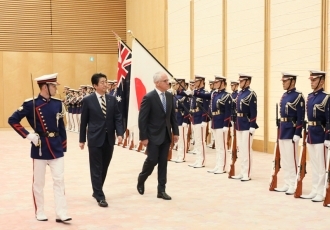 Photograph of the salute and the guard of honor ceremony
Photograph of the salute and the guard of honor ceremony(Photo: Cabinet Public Relations Office)
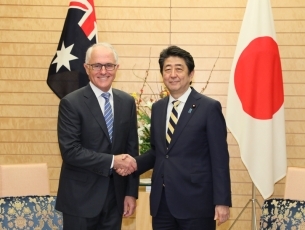 Photograph of the leaders shaking hands
Photograph of the leaders shaking hands(Photo: Cabinet Public Relations Office)
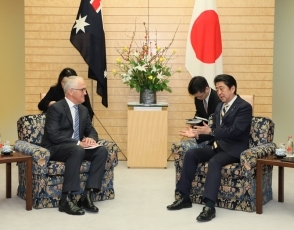 Photograph of the Japan-Australia Summit Meeting
Photograph of the Japan-Australia Summit Meeting(Photo: Cabinet Public Relations Office)
On Thursday, January 18, Mr. Shinzo Abe, Prime Minister of Japan, held a Japan-Australia Summit Meeting and other events with the Hon. Malcolm Turnbull MP, Prime Minister of the Commonwealth of Australia, who is making a working visit to Japan. To begin with, on January 18, commencing at shortly after 5:15 p.m. for approximately 45 minutes, a summit meeting (small-group meeting) was held, and following that, commencing at shortly after 6 p.m. for approximately 50 minutes, Prime Minister Turnbull attended a special meeting of the National Security Council (NSC). In addition, commencing at 6:55 p.m. for approximately 35 minutes, a summit meeting (expanded meeting) was held. The outcomes of the summit meeting were released in a joint press statement (English (PDF) / Japanese (PDF)
/ Japanese (PDF) ). Following the summit meeting, commencing at 7:30 p.m. for approximately one hour and 15 minutes, Prime Minister Abe hosted a dinner. The overview is as follows.
). Following the summit meeting, commencing at 7:30 p.m. for approximately one hour and 15 minutes, Prime Minister Abe hosted a dinner. The overview is as follows.
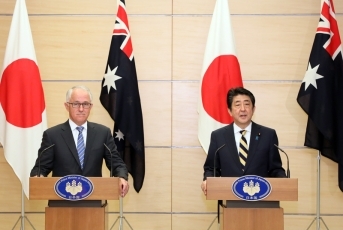 Photograph of the joint press announcement
Photograph of the joint press announcement
(Photo: Cabinet Public Relations Office)
1. Small-group meeting
At the small-group meeting the discussion centered on North Korea. Prime Minister Abe presented his recognition of the situation, which is that North Korea is making progress with North-South dialogue but is continuing with its nuclear and missile development, and so the situation is conversely deteriorating. On that basis, the two leaders shared the view that denuclearization consistently remains the goal, and that there can be no stability in the Asia-Pacific without denuclearization.
2. Special meeting (Four Ministers’ Meeting) of the NSC
At the special meeting (Four Ministers’ Meeting) of the NSC, a broad-ranging discussion took place that centered on future Japan-Australia security cooperation in the Indo-Pacific region, including policies for Japan and Australia to make greater contributions to the peace and stability of the region by further deepening their close security cooperation as “special strategic partners” that share fundamental values and strategic interests. It was confirmed that Japan will deepen collaboration and cooperation with Australia in order to realize the Free and Open Indo Pacific Strategy.
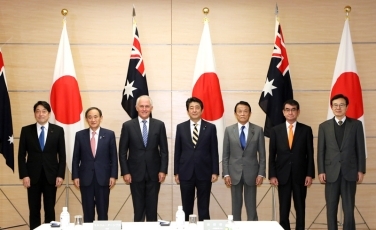 Photograph of the special meeting of the National Security Council
Photograph of the special meeting of the National Security Council
(meeting among four ministers)
(Photo: Cabinet Public Relations Office)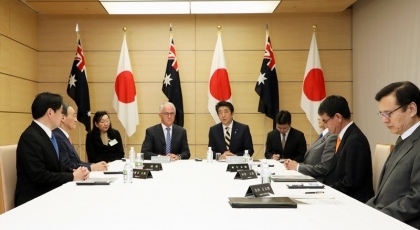 Photograph of the Prime Minister making a statement at
Photograph of the Prime Minister making a statement at
the special meeting of the National Security Council
(meeting among four ministers)
(Photo: Cabinet Public Relations Office)
3. Expanded meeting
The two leaders discussed bilateral cooperation and regional affairs
(1) Security and defense cooperation
Prime Minister Abe expressed his recognition that advancing security and defense cooperation between Japan and Australia will directly contribute to the peace and stability of the Indo-Pacific region. Additionally, Prime Minister Abe expressed his intention to strengthen both the quality and quantity of joint exercises involving Japan and Australia, based also on his visit of Japan Ground Self-Defense Force (JGSDF) Camp Narashino with Prime Minister Turnbull on the morning of the day the summit meeting was held, and Prime Minister Turnbull showed his concurrence. The two leaders shared the view that they will aim to conclude negotiations that are currently taking place between Japan and Australia on an agreement to facilitate mutual visits by the two countries’ defence forces as promptly as possible.
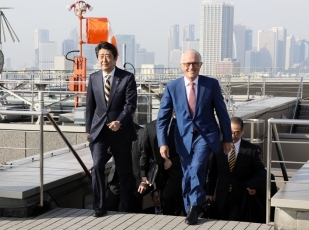 Photograph of the leaders heading to
Photograph of the leaders heading to
the JGSDF Narashino Training Area
(Photo: Cabinet Public Relations Office)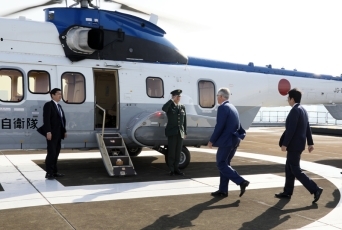 Photograph of the leaders heading to
Photograph of the leaders heading to
the JGSDF Narashino Training Area
(Photo: Cabinet Public Relations Office)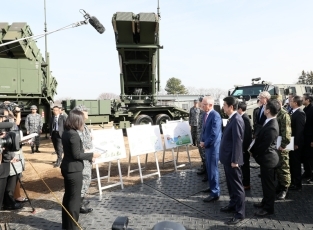 Photograph of the leaders visiting
Photograph of the leaders visiting
the JGSDF Narashino Training Area
(Photo: Cabinet Public Relations Office)
(2) Economic cooperation and people-to-people exchanges
The two leaders highly appreciated the concrete progress being made with Japan-Australia innovation cooperation, including the brown-coal hydrogen project and the utilization of quasi-zenith satellites, as well as cooperation between Japan and Australia in the fields of energy, including liquefied natural gas (LNG) and agriculture, and they shared the view that they will further promote collaboration. In addition, the two leaders shared the view that Japan and Australia will cooperate for the success of the 2019 Rugby World Cup and the 2020 Tokyo Olympic and Paralympic Games, and will strengthen people-to-people exchanges through these events, including at the regional level.
(3) Pacific island countries
The two leaders confirmed that Japan and Australia’s approaches in this region are aligned, and shared the view that Japan and Australia will cooperate closely for the success of the Eighth Pacific Islands Leaders Meeting (PALM 8) in May this year.
(4) Trilateral and quadrilateral cooperation
The two leaders appreciated the progress with trilateral and quadrilateral cooperation among Japan, Australia and the United States, Japan, Australia and India, and Japan, Australia, the United States and India, along with sharing the view that collaborations will continue.
(5) Trans-Pacific Partnership (TPP) and the Regional Comprehensive Economic Partnership (RCEP)
The two leaders confirmed they will collaborate closely on signing and bringing the TPP into effect promptly. In addition, with regard to the RCEP, the two leaders confirmed they will continue to collaborate closely in order to realize a high-quality agreement.
(6) Whaling
Prime Minister Turnbull raised the issue of whaling. Prime Minister Abe touched on Japan’s position, and expressed the view that efforts should be made to ensure that the whaling issue does not have a negative impact on the favorable bilateral relationship as a whole. Prime Minister Abe requested that excessive obstructive behavior at sea is prevented, and that effective responses are taken.
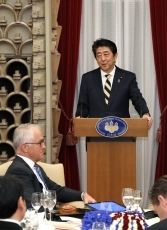 Photograph of the Prime Minister delivering
Photograph of the Prime Minister delivering
an address at the dinner banquet
(Photo: Cabinet Public Relations Office)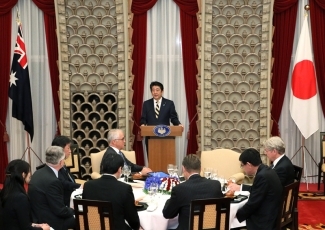 Photograph of the Prime Minister delivering
Photograph of the Prime Minister delivering
an address at the dinner banquet
(Photo: Cabinet Public Relations Office)

